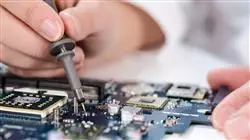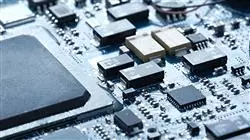University certificate
Accreditation/Membership
The world's largest faculty of engineering”
Introduction to the Program
This Master's Degree will give you the keys to know how to implement prototypes of electronic systems that will revolutionize electronic engineering"

Electronics are an essential part of today's economy and are also present in many everyday actions that are performed almost without thinking. The products and services that are used every day make use of them, so it is essential to address the storage of the energy that is generated and consumed, and its distribution and sale, in order to achieve top-level expertise. Certainly, this is an essential area for society, which, in addition, is involved in various sectors to provide them with innovative tools that facilitate their execution.
Engineers who decide to work in this field are aware of the importance of looking for highly specialized programs with which to obtain advanced, useful and quality knowledge that can be of great help for their professional development. For this reason, TECH offers you this Master's Degree in Electronic Systems Engineering, a first level program that has been developed by a large group of teachers with extensive experience in the sector.
This Master's Degree will provide specialized knowledge on the new lines of the labor market in an increasingly dynamic world, from embedded systems, real time systems, energy, health, transportation, distribution, communication and marketing. In this way, students will become professionals of the future, capable of tackling jobs related to sustainable energy, IoT, autonomous cars, smart buildings, satellite communications, energy generation, distribution and storage, medical electronics, robotics, control, security. Specifically, all the elements of society that have an electronic component associated with them.
A 100% online Postgraduate Certificate that will allow students to distribute their study time, not being conditioned by fixed schedules or the need to move to another physical location, being able to access all the contents at any time of the day, balancing their work and personal life with their academic life.
Knowing how to design, analyze and control electronic systems will position you as a reference professional in the industry”
Esta Master's Degree in Electronic Systems Engineering contains the most complete and up-to-date program on the market. The most important features include:
- Case studies presented by experts in Electronics Engineering
- The graphic, schematic, and practical contents with which they are created, provide scientific and practical information on the disciplines that are essential for professional practice
- Practical exercises where the self-assessment process can be carried out to improve learning
- Special emphasis on innovative methodologies in Electronic Systems Engineering
- Theoretical lessons, questions to the expert, debate forums on controversial topics, and individual reflection assignments
- Content that is accessible from any fixed or portable device with an Internet connection
This program will help you to boost your qualifications and enhance your professional growth”
Its teaching staff includes professionals from the field of engineering, who contribute their work experience to this program, as well as renowned specialists from leading companies and prestigious universities.
The multimedia content, developed with the latest educational technology, will provide the professional with situated and contextual learning, i.e., a simulated environment that will provide an immersive learning experience designed to prepare for real-life situations.
This program is designed around Problem-Based Learning, whereby the student must try to solve the different professional practice situations that arise throughout the program. For this purpose, the student will be assisted by an innovative interactive video system created by renowned and experienced experts.
TECH proposes a didactic methodology focused on practical cases to reinforce theoretical knowledge, which favors the learning process"

A top-level program, designed with the most up-to-date material on the market"
Why study at TECH?
TECH is the world’s largest online university. With an impressive catalog of more than 14,000 university programs available in 11 languages, it is positioned as a leader in employability, with a 99% job placement rate. In addition, it relies on an enormous faculty of more than 6,000 professors of the highest international renown.

Study at the world's largest online university and guarantee your professional success. The future starts at TECH”
The world’s best online university according to FORBES
The prestigious Forbes magazine, specialized in business and finance, has highlighted TECH as “the world's best online university” This is what they have recently stated in an article in their digital edition in which they echo the success story of this institution, “thanks to the academic offer it provides, the selection of its teaching staff, and an innovative learning method aimed at educating the professionals of the future”
A revolutionary study method, a cutting-edge faculty and a practical focus: the key to TECH's success.
The most complete study plans on the university scene
TECH offers the most complete study plans on the university scene, with syllabuses that cover fundamental concepts and, at the same time, the main scientific advances in their specific scientific areas. In addition, these programs are continuously being updated to guarantee students the academic vanguard and the most in-demand professional skills. In this way, the university's qualifications provide its graduates with a significant advantage to propel their careers to success.
TECH offers the most comprehensive and intensive study plans on the current university scene.
A world-class teaching staff
TECH's teaching staff is made up of more than 6,000 professors with the highest international recognition. Professors, researchers and top executives of multinational companies, including Isaiah Covington, performance coach of the Boston Celtics; Magda Romanska, principal investigator at Harvard MetaLAB; Ignacio Wistumba, chairman of the department of translational molecular pathology at MD Anderson Cancer Center; and D.W. Pine, creative director of TIME magazine, among others.
Internationally renowned experts, specialized in different branches of Health, Technology, Communication and Business, form part of the TECH faculty.
A unique learning method
TECH is the first university to use Relearning in all its programs. It is the best online learning methodology, accredited with international teaching quality certifications, provided by prestigious educational agencies. In addition, this disruptive educational model is complemented with the “Case Method”, thereby setting up a unique online teaching strategy. Innovative teaching resources are also implemented, including detailed videos, infographics and interactive summaries.
TECH combines Relearning and the Case Method in all its university programs to guarantee excellent theoretical and practical learning, studying whenever and wherever you want.
The world's largest online university
TECH is the world’s largest online university. We are the largest educational institution, with the best and widest online educational catalog, one hundred percent online and covering the vast majority of areas of knowledge. We offer a large selection of our own degrees and accredited online undergraduate and postgraduate degrees. In total, more than 14,000 university degrees, in eleven different languages, make us the largest educational largest in the world.
TECH has the world's most extensive catalog of academic and official programs, available in more than 11 languages.
Google Premier Partner
The American technology giant has awarded TECH the Google Google Premier Partner badge. This award, which is only available to 3% of the world's companies, highlights the efficient, flexible and tailored experience that this university provides to students. The recognition as a Google Premier Partner not only accredits the maximum rigor, performance and investment in TECH's digital infrastructures, but also places this university as one of the world's leading technology companies.
Google has positioned TECH in the top 3% of the world's most important technology companies by awarding it its Google Premier Partner badge.
The official online university of the NBA
TECH is the official online university of the NBA. Thanks to our agreement with the biggest league in basketball, we offer our students exclusive university programs, as well as a wide variety of educational resources focused on the business of the league and other areas of the sports industry. Each program is made up of a uniquely designed syllabus and features exceptional guest hosts: professionals with a distinguished sports background who will offer their expertise on the most relevant topics.
TECH has been selected by the NBA, the world's top basketball league, as its official online university.
The top-rated university by its students
Students have positioned TECH as the world's top-rated university on the main review websites, with a highest rating of 4.9 out of 5, obtained from more than 1,000 reviews. These results consolidate TECH as the benchmark university institution at an international level, reflecting the excellence and positive impact of its educational model.” reflecting the excellence and positive impact of its educational model.”
TECH is the world’s top-rated university by its students.
Leaders in employability
TECH has managed to become the leading university in employability. 99% of its students obtain jobs in the academic field they have studied, within one year of completing any of the university's programs. A similar number achieve immediate career enhancement. All this thanks to a study methodology that bases its effectiveness on the acquisition of practical skills, which are absolutely necessary for professional development.
99% of TECH graduates find a job within a year of completing their studies.
Master's Degree in Electronic Systems Engineering
Whether it is doing maintenance to indispensable tools in daily routine such as telecommunications and industrial machines, or innovating in futuristic fields such as robotics and virtual reality, engineering applied to electronics plays a transcendental role in the advancement of our society. It is for this reason, and given the great potential for job growth in this field, that TECH Global University offers the Master's Degree in Electronic Systems Engineering: a completely online postgraduate program that covers in ten modules everything related to the world of microcontrollers, integrated circuits, sensors, current conversion and digital processes. Using a convenient curricular scheme free of fixed schedules and coupled with methodological innovations in higher education, you will have full access to a unique content that you can study even from a smartphone. Do you want to learn about design techniques for embedded systems, programmable logic devices and microcontrollers, or bioelectric signal processing? Then take advantage of this program.
Qualify yourself as an expert engineer in electronic systems
The technological revolution is a fact that you can't stay away from. From the GPS used by the car that takes us to our destination to the drone that shows us a panoramic shot in some news report; every device that facilitates the tasks in our daily lives has advanced to unimaginable scales thanks to this metamorphosis that technology has had in recent times and that would not be possible without improvements in electronic systems. Possessing solid skills in this branch of engineering is to have a master key to ensure a bright future, and with TECH you will be able to achieve it. Our postgraduate program is an unmissable alternative to delve into a variety of useful topics: circuit design and electromechanical elements such as coils, power converters, digital processing, biomedical electronics, energy efficiency, among several others, including industrial marketing. Flexible classes, interactive material, highly qualified teachers and a sophisticated educational platform: everything you need to boost your career in one place.







